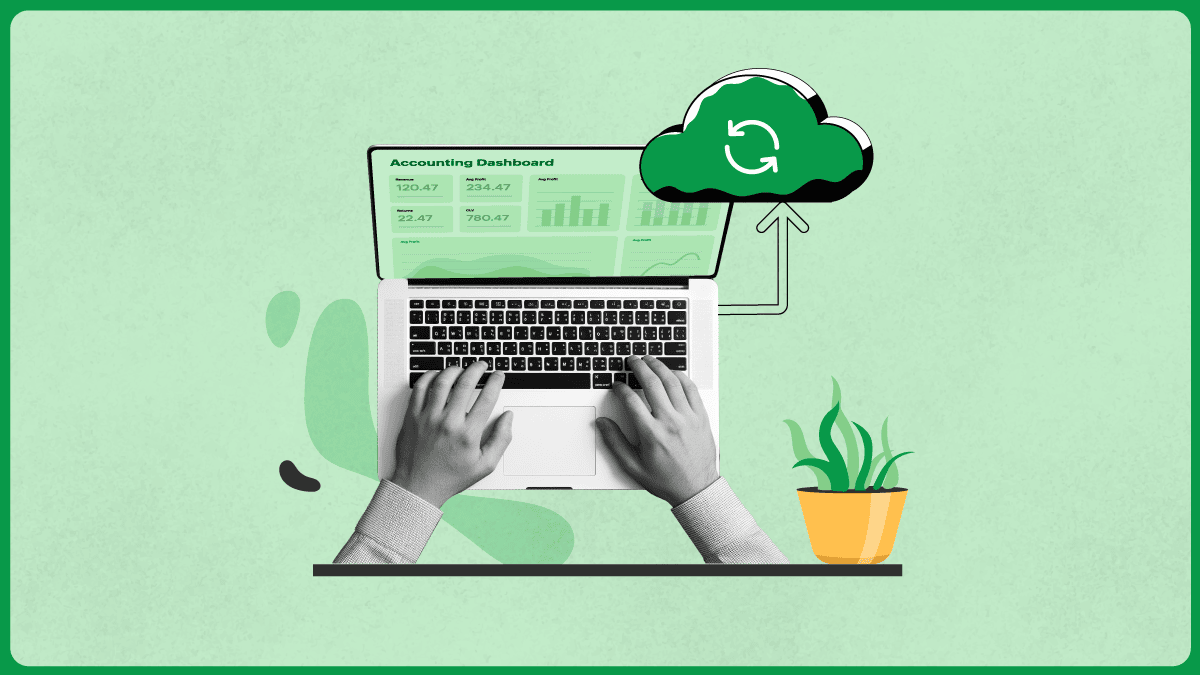- HOME
- Accounting
- What is cloud accounting software? A complete beginner’s guide
What is cloud accounting software? A complete beginner’s guide

Accounting used to mean stacks of files, late nights with spreadsheets, and a hundred calls to check if someone made a payment. Now? It can mean sipping coffee while your books reconcile themselves in the background.
That’s the promise of cloud accounting software and it’s not just a convenience, it’s a competitive advantage.
If you're a freelancer, an entrepreneur, or run a growing business, this beginner-friendly guide will help you understand what cloud accounting really is, how it works, and how it can make your day-to-day operations easier using tools like Zoho Books and the Zoho Finance Suite.
What is cloud accounting software?
Cloud accounting software is an online platform where your financial data is stored, updated, and accessed in real time over the internet. You don’t need to install anything. You just log in through a browser or app, and your books are ready wherever you are.
It’s secure, collaborative, and built for modern business needs.
A good example is Zoho Books—a cloud-based accounting tool that lets you send invoices, track expenses, manage bank feeds, file taxes, and collaborate with your accountant without ever emailing a spreadsheet file again.
Why it matters: Real-world scenarios that hit home
Scenario 1: The traveling entrepreneur
Radhika runs a sustainable skincare brand based in Jaipur but spends 15 days a month attending exhibitions across India.
Before cloud accounting
She’d collect paper bills in a pouch, return to the office, hand them to her accountant, and get her monthly numbers two weeks later.
After switching to Zoho Books
- She uploads photos of expenses using the mobile app.
- Her finance team sees expenses in real time.
- She views her cash flow and tax dues from her hotel room.
Now, Radhika closes her monthly books on time, even when she’s not in town.
Scenario 2: The growing startup
Shreya runs a bootstrapped startup with teams in Bengaluru and Pune. With multiple people spending on tools, travel, and team lunches, tracking expenses became a nightmare.
Zoho Expense, part of the Zoho Finance Suite, helped them:
- Set monthly budgets for departments.
- Automate approval flows for reimbursements.
- Sync expenses directly into Zoho Books for accounting.
Today, every rupee is accounted for, and every team lead has visibility.
Scenario 3: The inventory-heavy retailer
Deepak runs a chain of pet stores in three cities and sells products online. Stock outs and order mismatches were killing customer trust.
With Zoho Inventory integrated with Zoho Books:
- Inventory levels update instantly after each sale.
- Sales, shipping, and accounting stay in sync.
- His accountant closes books without asking for stock updates.
No more “we’ll call you back” on customer orders. Deepak runs a tighter ship.
Scenario 4: The CA firm that leveled up
Priya’s firm handles 50+ clients, from influencers to small manufacturers. Juggling spreadsheets, shared drives, and back-and-forth calls wasn’t scalable.
Now, using Zoho Books + Zoho Practice:
- She invites clients to a shared client portal.
- Clients upload bills, view reports, and approve entries online.
- Her team manages compliance, filings, and collaboration in one place.
The firm now operates like a tech-first advisory practice—and clients love the experience.
Why cloud accounting beats traditional tools
Old-school accounting tools tie you to one system, involve endless back-and-forth with spreadsheets, and make things like tax filing and reconciliation feel like a full-time job. Cloud accounting changes all that.
With tools like Zoho Books, you can access your books from anywhere, work with your team in real time, and let the software handle things like GST, TDS, invoicing, and bank feeds automatically. It connects with your other apps, keeps everything synced, and scales as your business grows—no IT headaches or messy upgrades needed. It's accounting made simpler, faster, and smarter.
Features that help you run smoother
- Connected banking: Link your bank and get daily feeds auto-matched with your transactions in Zoho Books.
- Online payments: Use Zoho Checkout to share payment links and accept payments in minutes.
- Subscription billing: With Zoho Billing, automate your recurring invoices, reminders, and proration for subscription businesses.
- Auto-reconciliation: Clean books in a few clicks. No more bank mismatches.
- Audit trail & approvals: Every change is logged, and workflows ensure checks and balances.
Who should use it?
- A freelancer or content creator tired of chasing payments.
- A CA firm looking to scale efficiently.
- An online seller managing inventory and GST.
- A non-profit tracking donors and grants.
Cloud accounting software like Zoho is built to adapt to your workflow, not the other way around.
Final thoughts: The cloud is not the future—it’s now
In a world where business happens online, your accounts shouldn’t be stuck in the past. Cloud accounting helps you:
- Save time
- Stay compliant
- Get better visibility
- Work from anywhere
Most importantly, it gives you the confidence that your numbers are always one click away—clean, current, and compliant.
Take the first step toward a smarter, stress-free practice.
Try Zoho Practice for free and see how it simplifies your everyday client workflows, so you can focus on what really matters, advising.